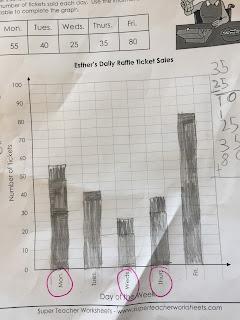Graphs, Math, and Parenting--Why I Want to Understand
 |
| This is how I want life always to be. Happy, ideal, Instagram-worthy. It is not always like this. |
First, I'd like to submit these for your consideration. Pay close attention to number 7.
 Scene: 8:12 a.m. The girls have made themselves gooey Nutella and peanut butter sandwiches for breakfast. I am standing at the stove cooking eggs so they won't crash in an hour at school. Beatrix has put off her math homework until right now--twenty minutes before we must leave. But that is better than cramming homework in her desk at school, so I'm not saying a thing.
Scene: 8:12 a.m. The girls have made themselves gooey Nutella and peanut butter sandwiches for breakfast. I am standing at the stove cooking eggs so they won't crash in an hour at school. Beatrix has put off her math homework until right now--twenty minutes before we must leave. But that is better than cramming homework in her desk at school, so I'm not saying a thing.Both girls bear marks of Nutella, especially Bea, who has smeared her hands down both legs of her pants, an unfortunate habit. Elspeth leans over Bea's homework. She has already given her the answer for a problem on the previous page because Beatrix craftily misled her to believe that these math sheets weren't really homework, but just for fun. Now I've told E that B needs to do her own work. "You're doing that the wrong way," E comments now.
"No, I'm not."
"Yup, you are."
"No, she's not," I interject from the stove. "Number 7 asks how many tickets were sold after Tuesday. So she is adding up Wednesday, Thursday, and Friday."
Elspeth raises a Nutella-smudged hand and slaps herself in the face. "NO, Mom. That's NOT what the question is asking."
Discussion ensues that takes us through the rest of breakfast, wherein Elspeth slaps herself in the face five more times, states that she is right beyond a shadow of a doubt, and cites multiple, potential sources of corroboration, including a third-grade teacher she works for at school sometimes. Beatrix insists that Elspeth does not have to be right all the time. Elspeth insists that I should bet her a dollar so I can give it to her when I am humiliated by the truth. Beatrix tells me her friend M at school has a pet boiled egg that she takes to bed and into the shower. Elspeth whips out a piece of chalk and begins proving her solution on the kitchen chalkboard.
Finally I throw up my hands and say I don't care how Bea does the math problem. Then we head off to school and Bea forgets her homework on the front stairs, which doesn't really matter because she never finished it anyway.
 All this time 11-year old E is pounding herself on the forehead and repeating a phrase that has quickly become familiar to me: "MOO-OOM, you don't understand."
All this time 11-year old E is pounding herself on the forehead and repeating a phrase that has quickly become familiar to me: "MOO-OOM, you don't understand."Oh, but I do, young whippersnapper. Yesterday on the way to school I thought it would be reasonable to try to explain my perspective to E. "Parents have a limited amount of energy, just like everyone else. So when I am reminding you to do the same thing four times in a row or telling you not to sass me, that takes a lot of energy. And it isn't fun. We could be spending that same energy on having fun together, talking about things, enjoying time as a family. Do you understand?"
She said she did. But Elspeth my kid who charges fastest into an argument, who is fiercely independent and original, whose energy is impossible to bottle. She is so much like me that it drives me crazy--except she is brilliant in math and I am a math ass. In fairness, this morning she wasn't sassing me, she was just convinced she was right, and she probably was. And now the thing that is sticking in my mind like a little burr (besides Bea's friend's pet boiled egg) is her chorus:
"You don't understand!"
A stock phrase for teens, yes, but it is humbling to think about late at night when I stare at the ceiling and vow to love on my kids more, let go of things that don't matter, and do everything in my power to give them freedom to become who they are--even as I do the boring, hard work of correcting, reminding and doling out consequences. But why is it such a drag sometimes?
The truth is, I don't have the time or energy to always understand everyone or everything. We all have limited energies. But my heart tells me to listen more, judge less, even with my children. I'm often more generous with strangers or friends than I am with my own family.
In one of my favorite movies of all time, Enchanted April (after a book by Elizabeth Von Arnim) four deeply unhappy women escape rainy, cold London for an Italian villa on the edge of the sea.
 |
| "For those who appreciate wisteria and sunshine"-- photo from the BBC |
"The great thing is to have lots of love about. . .I was a stingy beast at home, and used to measure and count. I had a queer obsession about justice. As though justice mattered. As though justice can really be distinguished from vengeance."
 |
| from the movie, which I adore but Martin pronounces 'too slow' |
Of course justice matters--but what Rose says here washes over me every time because it points to a very natural human obsession with perfect balances. I won't give you an inch if you don't give me an inch. I won't love you if you don't love me--and in my parenting, You are making me spend my energy on correcting you, so I have no time left to try to understand you.
This truly is a false dichotomy, and one I don't want to follow through E's teenage years. I have noticed how disarming it is just to pause from the verbal sparring to give my girl a big hug. By my squeeze I tell her:
"The important thing is to have lots of love about."
And that's what--even in my weary moments--I want to enact in my life, my home, and my community: focusing less on correctness and more on understanding; giving a whole lot more hugs.So who is right--How many tickets were sold after Tuesday? Truth is, I don't really care. But watching E filled with excitement as she tried to impart her learning to me--that I understand. And I love.
-
For more on The Enchanted April, either read a copy, watch the movie, read this great description--or all three.



Comments